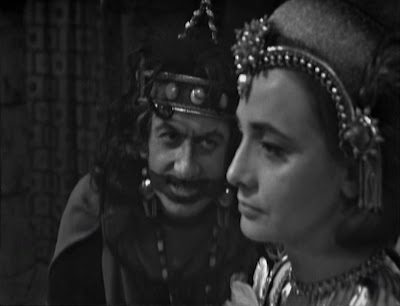But you can't rewrite history. Not one line!--the Doctor
 |
"The Temple of Evil", 23 May 1964
"The Warriors of Death", 30 May 1964
"The Bride of Sacrifice", 6 June 1964
"The Day of Darkness", 13 June 1964
Written by John Lucarotti
Directed by John Crockett
Script editor: David Whitaker
Produced by Verity Lambert
Associate producer: Mervyn Pinfield
William Hartnell as the Doctor
William Russell as Ian Chesterton
Jacqueline Hill as Barbara Wright
Carole Ann Ford as Susan Foreman
And so we come, in Doctor Who's earliest surviving historical,* to the programme's first serious examination of the existential issues that time travel raises.
The TARDIS materialises inside the tomb of a great Aztec leader. Barbara is instantly able to identify the tomb as Aztec--she specialised in the Aztecs at university. She greatly admires their civilisation, and bitterly resents its destruction at the hands of the Spanish. She blames that destruction on the Aztec practice of human sacrifice, which, she feels, blinded the conquistadors to all that was good about Aztec society.
When she emerges from the tomb, Barbara finds herself mistaken for the reincarnation of Yetaxa, the deceased high priest buried within it. The Aztecs living in the city outside enthrone her in the temple's central precinct, and the Doctor, Ian and Susan find themselves treated as her divine servants. Barbara is delighted at the mixup, as she immediately determines to use the Aztecs' perception of her as a god to put an end to human sacrifice, thus setting up Aztec civilisation to survive the coming of the Spanish in a hundred years.
There's a lot of different sides to the debates that get raised by "The Aztecs", and they all get their own advocate in the story. First, there's the argument amongst the TARDIS crew, with the Doctor and Ian both horrified and outraged at Barbara's plan. Barbara takes the idealist viewpoint, seeing the possibility of making the world better. The Doctor objects on principle--he's seeing himself as the custodian of history, and changing that history is just wrong. Ian's objection is more pragmatic: he thinks Barbara is being foolishly irresponsible, placing all four of them in great jeopardy by attacking one of the Aztecs' fundamental religious beliefs.
Meanwhile, the dilemma facing the Aztecs is played out in the dialogue between the two high priests: Autloc, high priest of Wisdom, and Tlotoxl, high priest of Sacrifice. Gentle, rational Autloc already doubted the efficacy of human sacrifice even before the TARDIS arrived, and he undergoes a profound crisis of conscience as he struggles with whether or not Barbara really is the reincarnation of one of his gods. Eventually, he gives up all his possessions and walks off into the wilderness, presumably to die, seeking spiritual enlightenment. Tlotoxl, on the other hand, is bloodthirsty, crafty and conniving. He probably doesn't really believe sacrifice is a divinely necessary act--the Doctor points out that he's carefully "timing their miracle" to make sure the sacrifice is conducted just a few moments before the first rains fall--but he's determined to preserve it, since it's how he maintains power. Time and again, he manoeuvres others so that his own aims get furthered.
My favourite speech in the whole story belongs to Ian, as the situation is rapidly deteriorating in part three. He chastises Barbara because of how tenaciously she clings to the fact that Autloc agrees with her about the evilness of human sacrifice. She tells herself that there are many more like Autloc, if only she can remove Tlotoxl's misguiding influence. But Ian points out to her that she's got it the wrong way round--it's Autloc who's the exceptional, unusual one, and it's Tlotoxl whose views reflect the feelings of the Aztec population.
In the end, of course, Barbara fails, and Tlotoxl triumphantly carves the heart out of a sacrificial victim to "restore" the sun in the midst of a solar eclipse, while the time travellers escape back into the TARDIS and depart. The Doctor is grimly satisfied that history has been preserved; Barbara regrets the failure of her attempt, but defiant in believing the attempt was still worth waiting. Really, we've not had any answers--neither the Doctor and Ian, nor Barbara, has managed to convince the other side of the correctness of their viewpoint. We don't even know if Barbara's attempt to change history failed because she just didn't manage to succeed this time, or because time in Doctor Who has some mechanism to prevent history from being changed.
That's my favourite way to treat questions like this, to be honest--we've had the questions, we've had the debates, but if we want any conclusions, we'll have to reach them on our own.
What Lisa thought: I'm pretty sure Lisa's favourite part of the story was the romance between the Doctor and Cameca, which she described as "super sweet". It's a charming little love story between a pair who've both been widowed and each find a kindred spirit, and you can see the Doctor's gruff defences drop whenever he's with Cameca. The close of episode four features a beautiful moment, as the Doctor leaves the seal Cameca gave him on the real Yetaxa's sarcophagus just before he enters the TARDIS. Then, rather testily, he turns back, picks up the seal, and goes back into the TARDIS.
The next episode is "The Sensorites".
I
*"Marco Polo" has been lost in its entirety, and "An Unearthly Child" isn't a historical, since it takes place not during history, but prehistory.
No comments:
Post a Comment